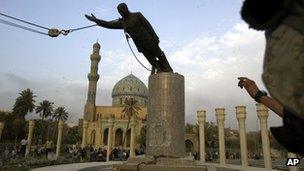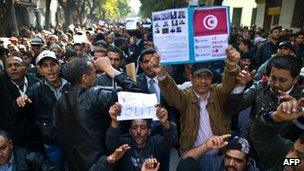Do Arabs need a new awakening to win true democracy?
- Published

Religious issues have dominated post-revolution politics in Egypt
Arabs in several countries around the Middle East are relishing the prospect of a new era built on political reform and democratic rule.
This craving for democracy was motivated by a desire to throw off the shackles of the past and finally achieve independence in every sense of the word.
This is hardly surprising. For decades, Arabs' self-esteem had been smothered by the totalitarian rule that followed colonial occupation. Colonialism itself had been preceded by centuries of Ottoman domination.
This long legacy is enduring and invidious. For all the euphoria and the undoubted bravery seen on the streets of Cairo and elsewhere, there remains a fundamental and persistent doubt amongst Arabs that democracy can work for them as free-thinking individuals.
And these doubts are prompting voters to seek the reassurance of religious or ethnic affiliation. This trend, by definition, limits freedom of choice, which is a pillar of independent, democratic life.
'Not fair'
In Tunisia and Egypt, for example, post-revolution politics has been dominated by Islamist groups.
The electoral success of Egypt's Muslim Brotherhood and Salafists has set a pattern that will not be easy to break. President Mohammed Mursi's promise to create an inclusive society will be hard to keep.
Prime Minister Hisham Qandil, on forming a new government, said it was time for Egyptians "to stop asking who is a Copt, a Muslim or a Salafi. I don't see that. All I see is that we are all Egyptians and this should be the main principle."

Saddam Hussein's toppling has ultimately resulted in highlighting ethnic and sectarian divisions in Iraq
This might be the ideal. But the overwhelming desire thus far in democracies in Arab countries has been for representation, first and foremost, on a sectarian or ethnic basis. This has been the case most obviously in Lebanon and Iraq.
Egypt looks like following suit, as the reaction to the formation of a technocrat-dominated cabinet has illustrated.
Egypt's Salafists complained that their strong showing in the parliamentary elections was not reflected in the apportioning of cabinet posts - they received none.
Muslim Brotherhood supporters felt aggrieved that only two of their members had become ministers; and the Copts were unhappy at the appearance of only one Christian in the cabinet.
"It is not right that Copts get treated in this way," Bishop Bakhomious, the acting head of the Coptic Church, told a Cairo newspaper. "We had expected an increase in the representation of Copts. The way the cabinet has been formed is not fair on us."
Egyptian Christians' unhappiness at the cabinet composition is an indicator of their lack of confidence in the new democratic system.
They feel that only their own strong representation in government would safeguard their interests. As a result, Copts are seeking to form political parties, thus strengthening further the grip of religion on democratic life.
Political paralysis?
The problem that President Mursi and other newcomers to Arab leadership will find is that democracies are being created in countries lacking political institutions and political parties that cut across sectarian and ethnic lines.
Secular parties, such as they are, were emasculated and discredited during the era of totalitarian rule and offer few attractions to first-time voters.
Give it time, one might say. Europe needed centuries to fine-tune its democratic traditions.
Perhaps new political parties might be established, rooted in Islamic traditions but espousing modern economic and social policies that could appeal to voters from all backgrounds.
But can this process be fast-tracked? The evidence in Lebanon and Iraq points unequivocally to the fact that turning the political machine around, once it has headed off down the sectarian and ethnic route, is well nigh impossible.

As many as 80 parties were formed after the ousting of Tunisia's President Zine al-Abidine Ben Ali
The Taif Agreement of 1989 was supposed to bring an end to political sectarianism in Lebanon. But cross-community politics is as elusive as ever.
Iraq, for its part, has slipped into a political system where Shia, Sunni and Kurdish loyalties are paramount. Iraqi national politics, as a result, is paralysed, while the major sectarian and ethnic groups vie for ascendancy.
Iraqis today face the unwelcome realisation that the removal of Saddam Hussein and the subsequent departure of the US military have failed to bring them true independence as free citizens of Iraq facing a range of political choices that are free of religious association.
Against this background, liberal and secular Arabs are bound to feel uneasy. For them, the euphoria experienced during those early days of protest has passed.
Al-Hayat columnist Raghida Dergham, writing in November 2011, observed: "We are on a swing of uncertainty, going up in celebration of the ouster of regimes that monopolised power for 30 or 40 odd years, then down in frustration over the alternative that is now coming to monopolise power with theocratic authoritarianism."
The Arabs, therefore, may have to wait for the next awakening before they can achieve true independence.
- Published13 July 2012
- Published18 July 2012
- Published13 August 2012